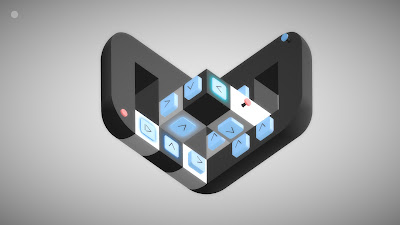Out of all of Maciej Targoni's simple puzzlers, I found PUSH to be the least appealing. It's not a terrible game per se, but it demands a lot of recalling and spatial manipulation, neither of which feel engaging to exercise. PUSH is one part memory matching game, another part code breaker, and a third part tedious fiddler—and it's the "tedious" part you'll experience the most. It's admittedly callous to criticize the game so harshly—especially considering its infinitesimal cost—but if you're looking for a nice, chill puzzler to soothe the brain-aches, Targoni himself has plenty better to offer.
PUSH starts off as simple as can be, requiring the player to click on matching buttons to solve each puzzle. Soon a pink knob is thrown into the mix which can rotate the object you're looking at, granting access to buttons hidden from your fixed view. The game carries on like this for a while, occasionally throwing a new gimmick your way like alternating black & white buttons or operating a jelly cube to push buttons you cannot. For the most part it's mildly entertaining, but a nagging suspicion will creep up the back of your neck, whispering that all you're really doing is mindless busywork.
Hook similarly suffered from this problem, the issue here is exacerbated in two ways: not only does a single incorrect guess reset a good chunk of the puzzle (if not the entire thing), but information is often concealed from the player, requiring constant rotations of the puzzle polyhedron. This isn't a big deal early on—so long as you can recall a handful of shapes—but the deeper you go the more the game tries to confound your memory. Eventually you'll be flicking switches faster than a mad scientist, checking each side in the hopes that you haven't forgotten a concealed button somewhere that could unravel the entire sequence. Understand that PUSH's hardest puzzles aren't its most complicated but rather its most obfuscated, where the solution veils itself in a surfeit of viewpoints.
Halfway through, PUSH doubles down on this approach, introducing buttons that must be pressed in a precise order. Thankfully the game denotes which button to start with, but deciphering the right path can still be an irksome experience. PUSH arbitrarily discounts buttons hidden from view, sometimes penalizing the player for forgetting a hidden button, yet other times discounting the hidden button entirely as part of its solution. You'll eventually grow accustomed to the game's strange reasoning, but it won't come with that special epiphany that defines the greatest puzzle games. Your comprehension will be a lukewarm "I guess" as you start over, trying to remember which button among the dozen hidden did you in.
Again, I don't think PUSH is a bad game; if you're a fan of Targoni & Hamster on Coke's work, you won't lose anything by ambling through PUSH. It's short, cheap, and at times kind of pretty in a minimalist way. But for me, it's just a little too unengaging to require the amount of memorization it asks of the player. Hook is for folks that like untying knots, Up Left Out has a huge variety of sliding tile puzzles, and PUSH... well, all it brings to the table is the feeling that you forgot your car keys over and over again.




No comments:
Post a Comment